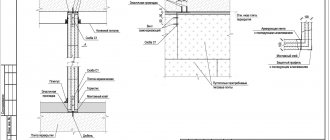Redevelopment and redevelopment of residential premises - what is it?
How is reconstruction different from redevelopment? Redevelopment is changes related to the design of the house, the number and location of rooms, windows, doors. Redevelopment will be considered the destruction of walls, cutting through new window and door openings or filling old ones with bricks. Reorganization includes the following actions:
- replacing gas stoves with electric ones and vice versa;
- changing the location and arrangement of bathrooms;
- laying electrical wiring, pipelines;
- other actions related to rearranging or changing equipment.
All changes made, both during redevelopment and reconstruction, must be documented and comply with the rules and standards accepted in the country. Therefore, before making changes, you should invite a specialist from the relevant service and obtain permission. If this is not done, the changes made will be illegal. The case will be heard in court. If the court finds the changes made dangerous, then it may order everything to be returned to its original state and pay a fine.
To avoid this, a preliminary examination of the redevelopment project . More details: 340-00-35 - office of construction expertise SINEO in St. Petersburg .
Question to the expert
Reconstruction and redevelopment of residential premises - concepts and types
All SINEO services are certified by GOST R ISO 9001-2015.
Legally, reconstruction and redevelopment refer to the same type of action, that is, changing the operational and technical qualities of the premises. Therefore, they must be indicated in the technical passport. Below is a list of what changes should be recorded in the technical passport of the building:
- combining adjacent rooms;
- creating door and window openings, changing their shape and size;
- construction of stairs;
- combining floors;
- construction of brick partitions (increases the load on the foundation);
- changing the floor structure;
- conversion of balconies into glazed loggias, expansion of the entrance to the balcony;
- relocation of bathrooms, gas equipment (stove, boiler, water heater), electric stoves, meters;
- changing gas equipment to electric;
- reinstallation of air conditioning and heating systems;
To carry out all of the above work, it is necessary to obtain permission from local governments.
If the changes were made without permission, but do not pose a danger to others, then the court can legalize the changes made. However, you will have to pay a fine and re-issue your documents. To confirm that the changes are safe for the house and its residents, the court will require an examination of the apartment redevelopment . The size of the fine will also depend on the results of the examination.
The best protection is approval of redevelopment
Prohibition of uncoordinated redevelopment is a necessary measure to ensure the safety of buildings. Therefore, all violations during redevelopment will be prosecuted in accordance with the law. An illegally redeveloped apartment cannot be sold, bought, and even difficult to officially rent out.
In view of this, if it is necessary to remodel a home or office, the most reliable way would be to coordinate the redevelopment of the apartment. To do this, you need to contact a company that specializes in the development of redevelopment projects and works with government agencies to coordinate all the documentation for such construction.
This is the most convenient and safe option, since the redevelopment project is developed by professionals.
Such specialists have all the necessary knowledge regarding risks, ways to ensure safety during reconstruction and the nuances of legislation. In addition, contacting these organizations significantly simplifies the entire process, since the customer does not require any effort in collecting documents and visiting a number of authorities.
The entire package of documents is fully prepared by the development company.
Full list of documents for obtaining permission for redevelopment:
- Title documents for the apartment.
- Apartment registration certificate.
- Floor plan of the house.
- Explication before and after redevelopment.
- Conclusion of Rospotrebnadzor.
- Conclusion of the sanitary and epidemiological station.
- Conclusion of the architectural planning department.
- Fire inspection report.
You may also need:
- Agreement with the design organization.
- Redevelopment project.
This is a complete package of documents that allow you to legally begin redevelopment. If it is carried out without prior approval, such a package will be needed in order to legitimize it.
Let's look at how to legalize redevelopment that has already been carried out. Please note that this is much more difficult to do than obtaining permission for redevelopment. To do this, you need to collect all the listed documents, starting from the technical passport of the apartment and the floor plan of the house to documents on ownership.
Then you should contact the municipal authorities to obtain legal confirmation of the alteration. If this fails, you will have to go to court.
Court decisions are not always positive. Often even minor changes are considered illegal. They are required to pay a fine and/or eliminate them.
It should be noted that redevelopment without approval is a significant problem when selling an apartment. The owner must legalize all changes to the design, since, otherwise, the responsibility for the redevelopment will be transferred to the buyer. In this situation, the price of the apartment decreases significantly.
A worker studies an apartment redevelopment project
The difference between redevelopment and refurbishment and reconstruction
Redevelopment and redevelopment are often confused with reconstruction, which is fundamentally wrong. Reconstruction is the restoration of a residential property, giving it its original appearance. The concept of “reconstruction” also includes the following work:
- creation/destruction of extensions and superstructures;
- replacing old structures with similar new ones;
- improvement of the facade and (or) interior of the premises;
- improvement of surrounding areas.
During reconstruction, only those changes are made to the technical passport of a house or apartment that led to a change in the technical and operational characteristics of the premises. Other, less significant information is not indicated in the document.
Construction and technical expertise ►
Differences between redevelopment and reconstruction
These works have a fundamental difference.
| In the process of reconstruction | During redevelopment |
| There is no transfer of load-bearing structures or changes in their characteristics, only their restoration is carried out to achieve their original properties | Changes or transfers are possible |
| Work may affect the foundation | Changes don't touch the foundation |
| The area of the rooms may change due to extensions and additional premises | Changes do not go beyond the actual area of the premises |
| Complete replacement of communications using modern materials | Replacement of utility networks is carried out extremely rarely, only if it is necessary to comply with the new configuration of the building |
| A complete replacement of the external facade finishing can be carried out | Repair work does not affect the facade, with the exception of window openings |
| The original design of the building does not change: key objects remain in place. Therefore, a new registration certificate is not issued. To carry out reconstruction, you need a project, and to combine loggias or balconies, you need permission from the city architecture | Replacement of the real estate registration certificate is required due to changes in the area and location of the premises |
The key difference between redevelopment and reconstruction is:
- the redevelopment does not affect the façade of the building;
- During reconstruction, it is possible to increase or decrease the area of the premises by adjusting the load-bearing structures, as well as changing the external walls of the building.
Residential renovation
The grounds and procedure for carrying out repair work in residential premises are regulated by Chapter 4 of the RF Economic Code.
According to the law, redevelopment can only be carried out after the work has been agreed upon with the authorized bodies. Upon completion of the redevelopment, all changes are checked and confirmed by an act of the acceptance committee.
Repair in non-residential premises
Unauthorized redevelopment cannot be carried out in non-residential premises. Thus, all adjustments in such buildings are automatically equated to reconstruction.
Reconstruction of non-residential buildings includes increasing their usable area, as well as making changes to load-bearing structures.
These works are regulated by Article 25 of the Housing Code of the Russian Federation, which lists all the work that can be considered reconstruction:
- installation, transfer or repair of utility networks;
- installation of new or complete replacement of old plumbing or electrical equipment.
Ban on redevelopment
Redevelopment and reconstruction of residential premises is prohibited if they:
- lead to a deterioration in the quality of other premises;
- make it difficult to access communications;
- lead to the building becoming unsafe;
- the house belongs to the defense department;
- The area of the premises obtained as a result of the work is less than 10 sq.m.
A ban on such types of work is imposed based on considerations of the safety of residents and the safety of their property. If you are not sure about the planned changes, contact professionals who will conduct an examination of the redevelopment project or, if the renovation has already begun, an examination of the redevelopment of the apartment at the initial stage.
When there is no need to coordinate redevelopment
The following types of work do not require approval and can be carried out at the discretion of the owner:
| Replacing old electrical wiring | Replacement of wiring is permitted if it does not require dismantling partitions. Removal of the outer layer of plaster is allowed. |
| Installation of additional lighting | This point also applies to replacing switches and sockets. In this case, the configuration and area of the room does not change. |
| Installation of new plumbing | A permit will not be required if the plumbing fixtures are installed in the same location. It is important that the owner does not plan installation in a place not intended for this. |
| Pipe replacement | This is a common type of work that is performed on the secondary market. No permit is required to replace pipes with modern ones. But work cannot be carried out during the heating season. |
| Finishing work | Wallpapering, installing new flooring and painting walls do not require approval from the Housing Inspectorate. It is important that the work is not large-scale. |
As a result, a permit is not required if the work does not affect load-bearing walls.
Cosmetic repairs and finishing
We are talking about repairs that do not affect the supporting structures. At the same time, upon completion of the work, the load on the building should not increase. Permission is not needed, since in this case redevelopment is not carried out.
The owner can carry out the following types of work without approval:
- Replace wallpaper or paint walls.
- Insulate the floors and install new flooring.
- Seal the walls, install soundproofing or insulation.
- Replace doors.
- Finish the balcony or loggia.
- Install a separate air conditioner or split system.
- Install a satellite dish or dish.
- Carry out renovations in the bathroom by replacing plumbing fixtures and pipes.
- Install the hood.
- Change the location of sockets and switches.
Note! A complete and detailed list of acceptable work is contained in the Housing Code of the Russian Federation.
Design changes
The Housing Code designates work that falls into the category of redevelopment, but does not require approval.
These include the following:
- Glazing of a loggia or balcony, if no structural changes are made.
- Expansion, transfer or narrowing of doorways, sealing and formation in a non-load-bearing wall.
- Remaking a doorway into an interior window or arch.
- Installing a shower instead of a bath.
- Installation and dismantling of the storage room, including wall storage.
Moving a stove in the kitchen
Moving the slab refers to redevelopment.
The need for approval depends on the type of slab being transferred. The following approaches are possible:
- Electric stove . It can be moved within the kitchen without obtaining permission.
- Gas stove . It must remain in the location specified for the slab. Any changes must be agreed with the Housing Inspectorate. Only replacement with another model is allowed.
If there is a gas stove in the kitchen, regulatory authorities will not allow the creation of a second passage or alteration of the doorway. With such a stove it is not allowed to combine the kitchen with the living room if we are talking about a one-room apartment.
Installing a partition on the landing
The installation of a vestibule is not a redevelopment that must be approved.
Residents can carry out any reconstruction subject to the following conditions:
- The structures do not interfere with other residents.
- They do not block emergency exits.
- They do not limit the ability of the management company’s employees to service the building (they do not block access to pipes, panels and access to the roof).
But to carry out any work on the staircase, the consent of all apartment owners located on a specific floor is required. If one of these apartments is municipal, permission will have to be obtained from the administration, which is legally the owner of the property.
How to write an application for redevelopment
Redevelopment cannot be carried out without proper documentation. In order not to have to deal with the law in the future, before starting work you must provide the local government with a set of the following documents:
- statement;
- documents confirming the right of ownership (property);
- new and old floor plan of an apartment or house;
- technical passport of the premises;
- a document confirming the consent of other residents to redevelopment and reconstruction;
- a conclusion that an examination was carried out and the changes made will not lead to the destruction of the building.
The application will be considered within 45 days, after which the local government will make a decision: allow or deny. The refusal may be due to a lack of documents provided, expert opinions, or the disagreement of other residents.
Please note that not in all cases it is necessary to collect a package of documents. For example, when installing a shower stall in a bathroom or interior partitions made of plasterboard, permission from the authorities is not required, since this is not considered either a redevelopment or refurbishment.
If you are not sure whether your actions are legal or do not want to deal with the documents yourself, contact specialists who conduct a technical examination of redevelopment and examination of apartment redevelopment . The SINEO company will help collect documents, provide advice on changes planned in the apartment and provide expert services.
Moreover, if you have already encountered problems, you have received a summons to court and are facing administrative punishment - the St. Petersburg Institute of Independent Expertise and Assessment can accompany you in court and provide legal support.
More details: 340-00-35. Call or write to us for a consultation!
How to legalize the renovation of an apartment
Reconstruction of the apartment will be considered unauthorized if it has not been agreed upon by the authority responsible for it. There are two options for legalizing the reorganization:
- administrative;
- judicial (in case of administrative refusal).
The administrative procedure is similar to the usual procedure for obtaining permission for reconstruction.
- You need to contact the housing inspectorate to find out if approval is necessary.
- Then you need to submit the package of documents described above and receive a receipt from the authority for receipt of the documents.
- Within 45 days, receive a decision on consent or refusal of reconstruction.
If the first option fails, then the citizen should go to court . It is necessary to prepare an administrative claim to challenge the decision and then submit it at the place of residence of the plaintiff or at the location of the defendant body.
The application is accompanied by a decision to refuse, a receipt for payment of the state fee and documents necessary for the reconstruction.
The court schedules a trial within a month. At a court hearing, it is necessary to prove that the reconstruction does not violate the rights and interests of other people, and also that it does not violate building codes and regulations.
It is important to note that the court may order a construction and technical examination , the costs of which are borne by the party applying for it.
After the court's decision is made , there is a one-month period for appeal. With this decision, you need to contact the BTI to make changes to the technical documents.
Unauthorized redevelopment
An attempt to unauthorizedly alter residential premises, without obtaining the appropriate permission, leads to quarrels with other residents and legal proceedings. Unauthorized changes are dangerous because they can lead to the complete destruction of the building if the builders destroy the integrity of the load-bearing structures.
If the redevelopment was carried out, and it did not affect the strength of the building, this does not mean that the procedure for registering changes can not be carried out. Unauthorized changes are still considered illegal. The court may decide to return the premises to their original appearance. To prevent this from happening, the owner should file a claim against the local government, indicating:
- your passport details;
- applicant's address;
- address of local government authorities;
- description of the request, save the changes made;
- positive conclusion of technical expertise of redevelopment ;
- a list of certificates and other documents attached to the claim;
- technical passport of the building from the BTI;
- date of compilation and personal signature.
Although redevelopment can be legalized after the fact, it is still better not to bring the matter to court and order an examination of the redevelopment project . It is still unknown what decision he will make. Regardless of any court decision, you will have to pay a large fine for arbitrary redevelopment and reconstruction.
SINEO experts conduct judicial and pre-trial technical construction examinations of redevelopment , repair, and construction. We also review expert opinions. This may be necessary if you have doubts about a study that has already been conducted and want to challenge its results. All services have been certified and comply with GOST R ISO 9001-2015. Call to find out the timing and cost of the examination of the redevelopment of your apartment: 340-00-35.
Check the cost








